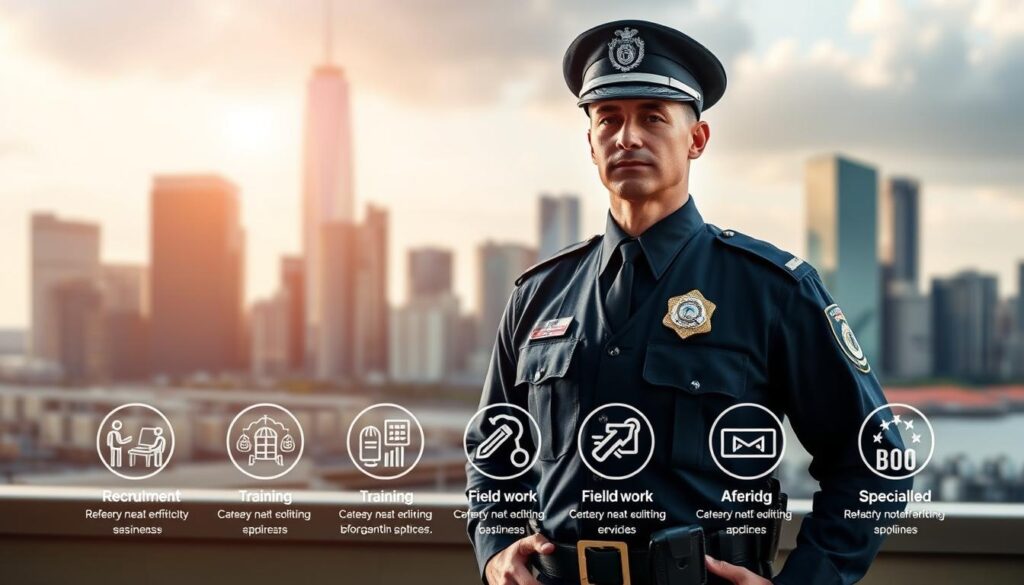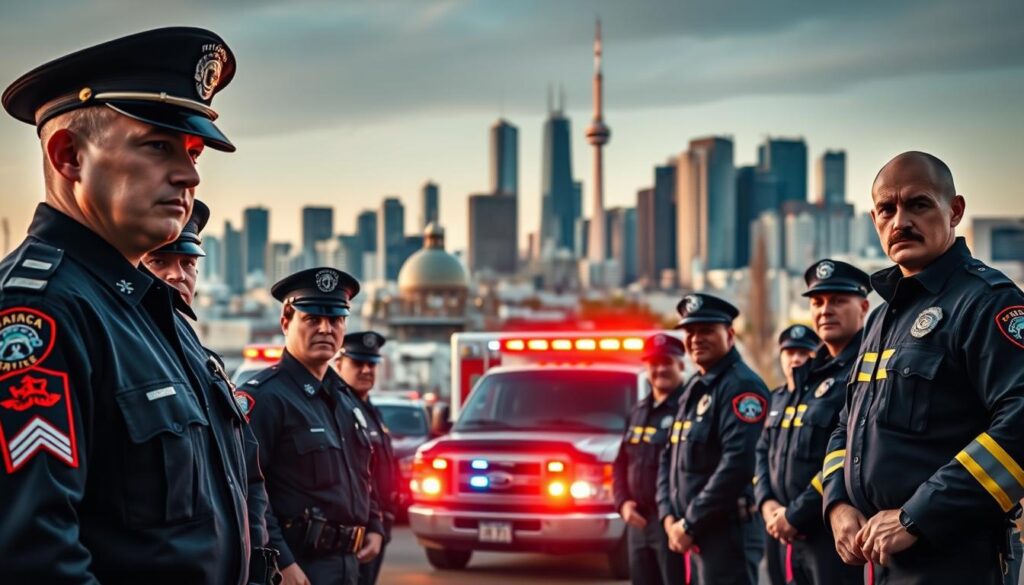Did you know over 40% of recent hires in Ontario’s public safety sector speak multiple languages? This reflects the growing need for professionals who mirror the province’s vibrant communities while addressing complex safety challenges.
Public safety roles now extend far beyond traditional expectations. From ensuring transportation security to managing regulatory compliance, these positions shape safer neighborhoods while offering competitive salaries, pension plans, and advancement paths. The Ontario Provincial Police alone provides paid training, health coverage, and mentorship programs tailored for diverse applicants.
Modern agencies prioritize inclusivity, actively recruiting individuals from Indigenous communities, racialized groups, and 2SLGBTQ+ populations. Fluency in additional languages isn’t just valued—it’s often essential for building trust in multicultural areas.
Whether you’re starting fresh or transitioning from another field, opportunities abound. Specialized roles in commercial vehicle oversight or community outreach let you create tangible impacts while enjoying job stability. Ready to explore how your skills could protect Ontario’s future?
Exploring Transportation Enforcement Roles

Every day, thousands of commercial vehicles travel highways under strict safety protocols. Specialized professionals in this field work to prevent accidents by ensuring carriers meet provincial standards. Their efforts directly reduce collisions while protecting drivers and cargo alike.
Core Duties in Vehicle Safety
Transportation officers conduct detailed inspections at weigh stations and during mobile patrols. They check brakes, cargo loads, and driver credentials to identify risks. When violations occur, they detain unsafe vehicles until issues are resolved. This proactive approach removes hazards before they cause harm.
Training and Physical Demands
A 12-week certification program prepares candidates for fieldwork. Key requirements include:
| Training Requirements | Certifications | Physical Standards |
|---|---|---|
| Vehicle inspection techniques | First Aid/CPR | Fitness test |
| Regulatory law education | Commercial vehicle operation | Mobility assessments |
| Conflict resolution | Hazardous materials handling | Vision/hearing checks |
Multi-Agency Partnerships
Officers regularly team up with police services and regulatory bodies during safety blitzes. These joint operations target high-risk corridors and repeat offenders. Through shared data and resources, they create unified strategies for accident prevention.
Steps to Start a Career in Enforcement and Safety

Starting a career in public safety requires more than ambition—it demands strategic preparation. You’ll need to balance technical knowledge with physical readiness while meeting strict eligibility criteria. Here’s how to position yourself for success in roles that prioritize community protection.
Preparing Your Application and Meeting Eligibility
Your journey begins with a valid Class G driver’s licence and clean security clearance. Agencies seek candidates who can interpret legislation accurately and apply policies during inspections. Shift flexibility is non-negotiable—you’ll work nights, weekends, and holidays in all weather conditions.
| Key Requirements | Certifications | Physical Benchmarks |
|---|---|---|
| Legislation interpretation | First Aid/CPR | 50lb equipment lifting |
| Conflict resolution | Hazard materials handling | Vehicle climbing/crawling |
| Weather resilience | Defensive tactics | Mobility assessments |
Essential Skills and Relationship Management
Strong communication separates adequate candidates from exceptional ones. You’ll regularly de-escalate tensions while issuing warnings or explaining violations. One training supervisor notes: “Empathy paired with firmness builds trust faster than authority alone.”
Mastering customer service in high-pressure scenarios proves critical. Whether inspecting cargo loads or collaborating with industry partners, your ability to maintain professionalism directly impacts public safety outcomes. Physical stamina supports these efforts—you’ll wear protective gear for hours while conducting precise inspections.
How to Get Started with Law Enforcement Careers Ontario

Securing a role in public safety begins with mastering the application process. Positions like Transportation Enforcement Officer appear on the Ontario Public Service Careers portal, where competition intensifies due to rigorous scoring systems. Applications require precise alignment with posted qualifications—every detail matters when only top candidates advance.
Navigating Application Processes and Selection Panels
Your first step involves crafting a cover letter that highlights hands-on experience with safety protocols or regulatory compliance. One hiring manager emphasizes: “Applicants who quantify achievements—like reducing inspection errors by 15%—stand out immediately.” Successful submissions trigger interview invitations, where you’ll present three professional references and undergo thorough background checks.
Insights on Career Advancement Opportunities
Beyond entry-level roles, agencies offer pathways matching diverse skills. The Ontario Provincial Police recruits for:
- Provincial Constables through paid training programs
- Civilian experts in forensic analysis or crisis communication
- Specialized units for hazardous materials management
Volunteer initiatives like the OPP Auxiliary provide practical experience while serving communities. Seasoned professionals from other provinces can transition via accelerated programs, demonstrating how adaptability fuels growth in this field.
Conclusion

Behind every safe community stand professionals dedicated to upholding standards. From ensuring commercial vehicles meet load restrictions to resolving zoning disputes, their work prevents risks before they escalate. These roles demand sharp problem-solving—whether addressing stray animal complaints or verifying taxi licensing.
Daily inspections keep roads secure while fostering trust in multicultural neighborhoods. Fluency in multiple languages often proves vital when explaining compliance issues or de-escalating conflicts. Your efforts directly reduce accidents and strengthen community bonds.
Ontario offers structured pathways into these essential roles, with paid training and mentorship programs. Whether ensuring hazardous materials transport safety or patrolling high-risk corridors, opportunities align with diverse skills. Physical stamina and shift flexibility remain non-negotiable for fieldwork involving vehicles and equipment.
You now grasp how these positions shape Canada’s safety landscape. Ready to contribute? Start refining your application today—your future in protecting communities begins here.

